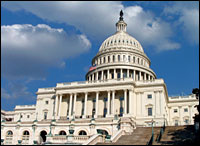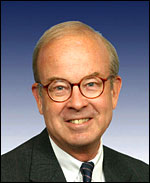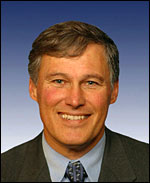 The Hill is ablaze with discussion of the Lieberman-Warner Climate Security Act, which is expected to hit the Senate floor in early June. But on the House side, movement on climate legislation has been slow and quiet.
The Hill is ablaze with discussion of the Lieberman-Warner Climate Security Act, which is expected to hit the Senate floor in early June. But on the House side, movement on climate legislation has been slow and quiet.

Several bills have been floated, but none have gained any real traction. Everyone is waiting to see what comes out of the Energy and Commerce Committee, where Reps. John Dingell (D-Mich.) and Rick Boucher (D-Va.) are collaborating on bill that’s expected to be substantially more industry-friendly than Lieberman-Warner. Dingell chairs the committee; Boucher chairs the Energy and Air Quality Subcommittee. “Hopefully we can produce the measure within the course of the next month to six weeks, but that will depend on the level of bipartisan cooperation we get on our committee,” Boucher told Grist.
Last fall, Dingell introduced a measure calling for a carbon tax, but in April said he was taking the idea “off the table” because he was concerned it would burden the economy. “This country is in dire economic circumstances and now is not the time to burden working families further,” Dingell told Grist in a written statement. “It is not the time for new taxes.” Dingell acknowledged, however, that “economists and other experts still suggest that a carbon tax would be the most efficient way of dealing with global warming.”
Dingell and Boucher have said their legislation will include a cap-and-trade system that would reduce greenhouse-gas emissions between 60 and 80 percent below 1990 levels by 2050. Boucher has stressed that they want a bill that is “industry-supported” and “would not dislocate any economic sector.” Dingell echoed that notion in April, saying he’s working on a bill that “protects our environment without putting the American economy at a disadvantage.” Beyond that, details are scarce.
One big question is how emissions credits would be distributed: given to industry free, or auctioned off to the highest bidder? This has been a major point of concern for environmental groups in regard to the Senate’s Lieberman-Warner bill, which would distribute billions of dollars in carbon credits to polluting industries, shifting gradually to an auction-based system. Many environmental groups, and both of the Democratic candidates for president, have called for immediate, 100 percent auction of credits, the proceeds of which could go toward renewable-energy R&D, green jobs programs, and efforts to help low-income Americans cope with higher energy prices.

Boucher told Grist that the inclusion of any level of auction was only “a remote possibility.” He said that “a system of free allocations to the emitting entities … really worked well” for the cap-and-trade program set up in the ’90s to curb the sulfur dioxide emissions largely responsible for acid rain.
Republican Response
Boucher says Republican cooperation is needed if a climate bill is to be successful, but it’s been slow in coming. GOP Reps. Mary Bono Mack (Calif.) and Michael Ferguson (N.J.) sent a letter (PDF) to Dingell and Boucher last year expressing interest in working on climate legislation. More recently, several House Republicans from coal states have started talking about how to craft an industry-friendly cap-and-trade bill, either in collaboration with Boucher or separately. Among them is Rep. Ed Whitfield (Ky.), who told Greenwire ($ub req’d) that he and others have been talking to the coal industry about what it would want legislation to look like.
But the ranking Republican on the Energy and Commerce Committee, Joe Barton (Texas), has been blocking GOP committee members — including Bono Mack, Ferguson, and Whitfield — from entering into negotiations on a mandatory cap-and-trade bill.
Some Republicans outside of the committee have expressed disappointment that GOP House leaders have not yet stepped up on the climate issue. “Too many in our caucus haven’t come to grips with whether they think global warming is legitimate,” Rep. Christopher Shays (R-Conn.) told Greenwire recently ($ub req’d). “Because of that, we’re losing a whole generation of voters who are really disgusted that we don’t get it. It’s very sad.”
The Little Select Committee That Could
While coal-state Republicans are trying to nudge Boucher and Dingell in an industry-friendly direction, the Select Committee for Energy Independence and Global Warming is pushing aggressively in a climate-friendly direction — as aggressively as it can, considering that the committee doesn’t have authority to markup legislation.

In late April, Committee Chair Ed Markey (D-Mass.) and member Jay Inslee (D-Wash.), along with Oversight Committee Chair Henry Waxman (D-Calif.), put out a statement of principles for climate legislation, and they’re notably tougher than anything under serious consideration in the Energy and Commerce Committee. The principles call for emissions reductions of 80 percent below 1990 levels by 2050, plus auctioning of emissions permits with proceeds going toward clean-energy technology and programs to help vulnerable communities and ecosystems. [UPDATE: Markey unveiled an aggressive climate bill on May 28.]
Waxman has put out his own global warming legislation, the Safe Climate Act, which hews to those principles and is similar to the strongest climate legislation in the Senate, the Boxer-Sanders bill. Waxman’s bill would also raise vehicle fuel-economy standards and call for 20 percent of U.S. electricity to come from renewable sources by 2020. While some provisions of Waxman’s bill would likely be discussed during a floor debate on climate, his bill itself is unlikely to go anywhere in this Congress.
“I think it’s going to be difficult to get a bill that can meet the principles that we really need this year, given the current make up of the Senate and the current occupant of the White House,” Inslee told Grist. But getting any climate bill to the House floor would be an important first step, he says. Unlike the Senate, which saw some serious consideration of the McCain-Lieberman Climate Stewardship Act in 2003 and 2005, the full House has never taken up the subject.
“It will help members become acquainted with these issues,” said Inslee. “It will force us to find where the sweet spot is to move a bill.”


